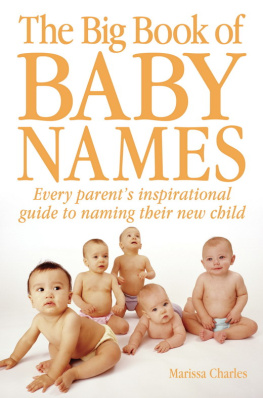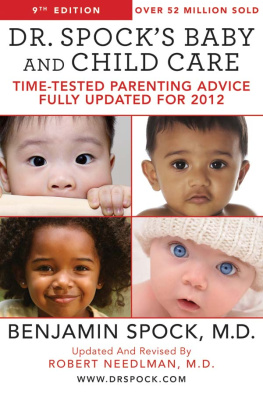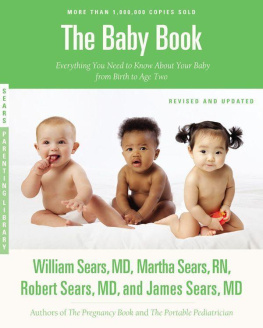A NOTE FROM THE AUTHOR
Your Baby & Child has always been written from babies and childrens points of view as far as we can understand them, but this new edition is special because we know and understand much more than we did even a decade ago.
The book is at least as much about child development as it is about childcare. It looks at children from before they are born until they reach compulsory school age. It looks at the successive tasks of physical development every infant must tackle, the kinds of thinking of which they gradually become capable, and the range and extremes of emotion that carry them along. However, this concentration on the development of infants does not mean ignoring parents and other caregivers. Babies and young children live minute by minute, hour by hour and day by day, and it is those small units of time that most concern the people who care for them, and rightly so. How that growing time passes and what it produces depends on the social context in which they are raised and that principally depends on the environment in which parents themselves are living. The social environment has radically changed in the last 20 years and is still changing; for example, climate change has been recognized as a mondial emergency with unprecedented acute weather events producing fire, floods and storms in many parts of the world. During the same period, political instability is bringing violence and the displacement of millions of people across the globe. Most recently, the COVID-19 pandemic has killed millions of people in most countries, wrecked economies, reduced living standards of communities within them, and disrupted individual families. Control measures, such as lockdowns, have directly affected babies and young children. Where some have benefited from having more time at home with parents, especially fathers; others are the victims of increased instances of abuse and neglect. But, although these and other societal changes have enormous impacts on family life, the relationship between individual infants and caring adults remains central.
Whatever your circumstances, the more you, and any other adults who regularly care for your child, can understand her, and recognize her present position on the developmental map that directs her growing up, the more interesting she will seem. The more interesting people find her, the more easily she will get the attention of all the adults who are important to her, and the more willing attention she gets, the more satisfied and satisfying responses she will give.
The happier you can make your baby, the more you will enjoy being with her, and the more you enjoy her, the happier she will be. And when she is unhappyas of course she sometimes will beyou will usually find yourselves unhappy as well. Indeed, theres a saying thats often quoted in my own family: You cant be happier than your least happy child. Your baby affects you just as much as you affect your baby. In fact, if you have spent years learning to maintain a business-like distance between your professional and personal lives, you may be astonished to discover how difficult it is to maintain any distance at all between adult lives and baby matters.
It is because you and your baby affect each other, for better or worse. Although this is a book, it does not suggest that you do things by the book but rather that you do them, always, by the baby. The book is organized by approximate age-stages, starting with what we know of a babys life in the womb and ending approximately five years and five sections later. The age-structuring is user-friendly (every parent always knows exactly how old her child is!), but if you use it to judge a babys or childs progress, you will be misusing it. Child development is a process, not a race. Every healthy baby starts from the same place and follows a similar course, passing certain milestones in a predetermined order. But every baby follows that course at his or her own personal rate, with idiosyncratic spurts, lags and pauses, with no prizes for speed. So, whether or not your child is the age indicated for the Older Baby or the Young Child, you will be ready for each new section when your child has completed most of the developments of the one before.
Of course, the baby or child for whom you are using this book may not be yours in the conventional and biological sense. You may have had help with her conception. She may have been adopted into your family; you may have joined his as a stepparent; she may be your grandchild, whose own parents cannot care for her, or your professional charge as a nanny or day-care provider. The you to whom the book is directly addressed is you whatever your relationship. I mean the word to apply to both parents when both are involved; to either one when he or she is coping alone, temporarily or permanently; and to anyone who cares for any small person. Babies dont care about genetics; they only care about caring.
You is an ungendered word, so its easy to write about caregivers irrespective of their gender. Not so babies. Although a handful of parents are determinedly avoiding identifying their baby as male or female, sometimes using they as a singular pronoun in place of the binary she or he reads very oddly. In the earlier editions, the baby or child in narrative was a boy or a girl. This time the text is as gender-neutral as it reasonably can be, but drifts from one sex to the other, chapter by chapter. If sex has a particular bearing on a point being made, you will find a boy or a girl specified. Otherwise, whichever gender the text refers to, what is said applies to all: to your child or the child you are thinking about.
A Note About the Author
Penelope Leach is a research psychologist and one of the worlds leading experts in child development and upbringing. She has two children and six grandchildren and is a lifelong advocate for parents and children. Her books include Your Baby & Child, Babyhood, Children First, Child Care Today, When Parents Part and Transforming Infant Wellbeing.
She is a fellow of the British Psychological Society, a founding member and trustee of AiMH UKthe UK branch of the World Association for Infant Mental Health (WAIMH)and has held honorary positions in professional organizations and charities working for families on both sides of the Atlantic.
PARENTS HAVE THEIR SAY
Unconditional love is a nonsensical notion.
Who came up with the absurd idea that parents shouldnt love children more when they are nice than when they are horrible, or to love the ones who behave themselves more than the ones who dont? I have a four-year-old boy and two girls who are three and one. The boy has always been difficult, and now he is at preschool and refusing to do anything but play. The director says his behavior is normal for four and had the nerve to suggest that I should stop pressuring him and comparing him with his sister because thats making him feel that Id love him more if hed learn something. Well, of course I would. Every parent would rather have a successful child than a loser. I pressure my son because he doesnt try hard enough, and I think thats right. How are children to learn to work and do better if everyone just says, Thats okay, we love you whatever you do?






